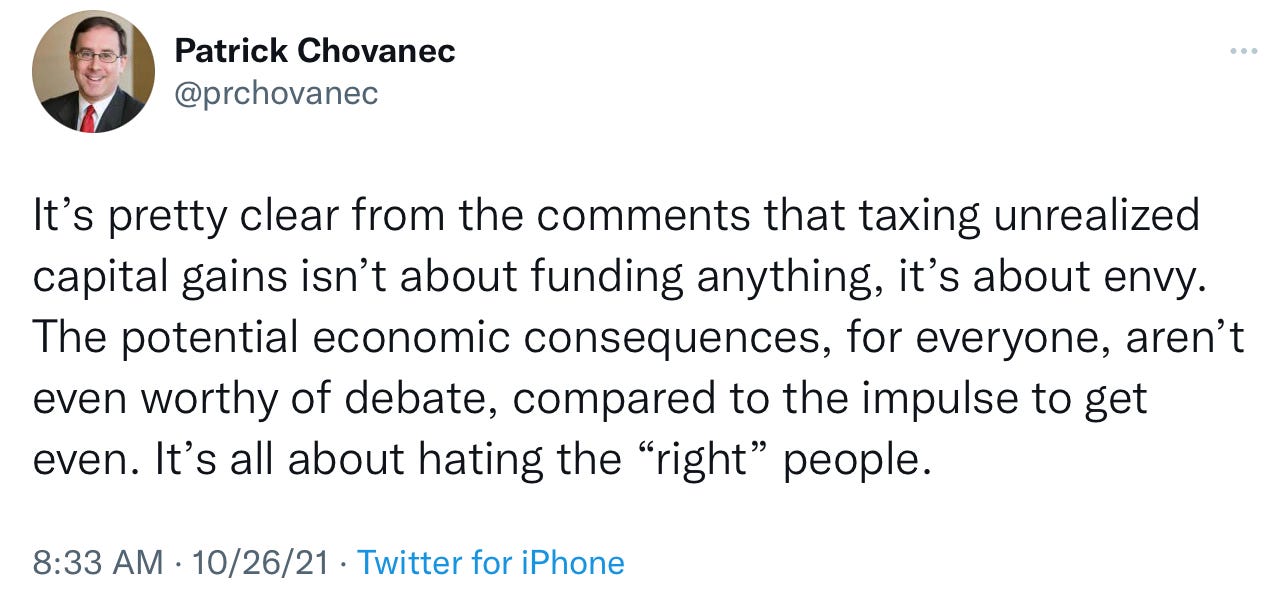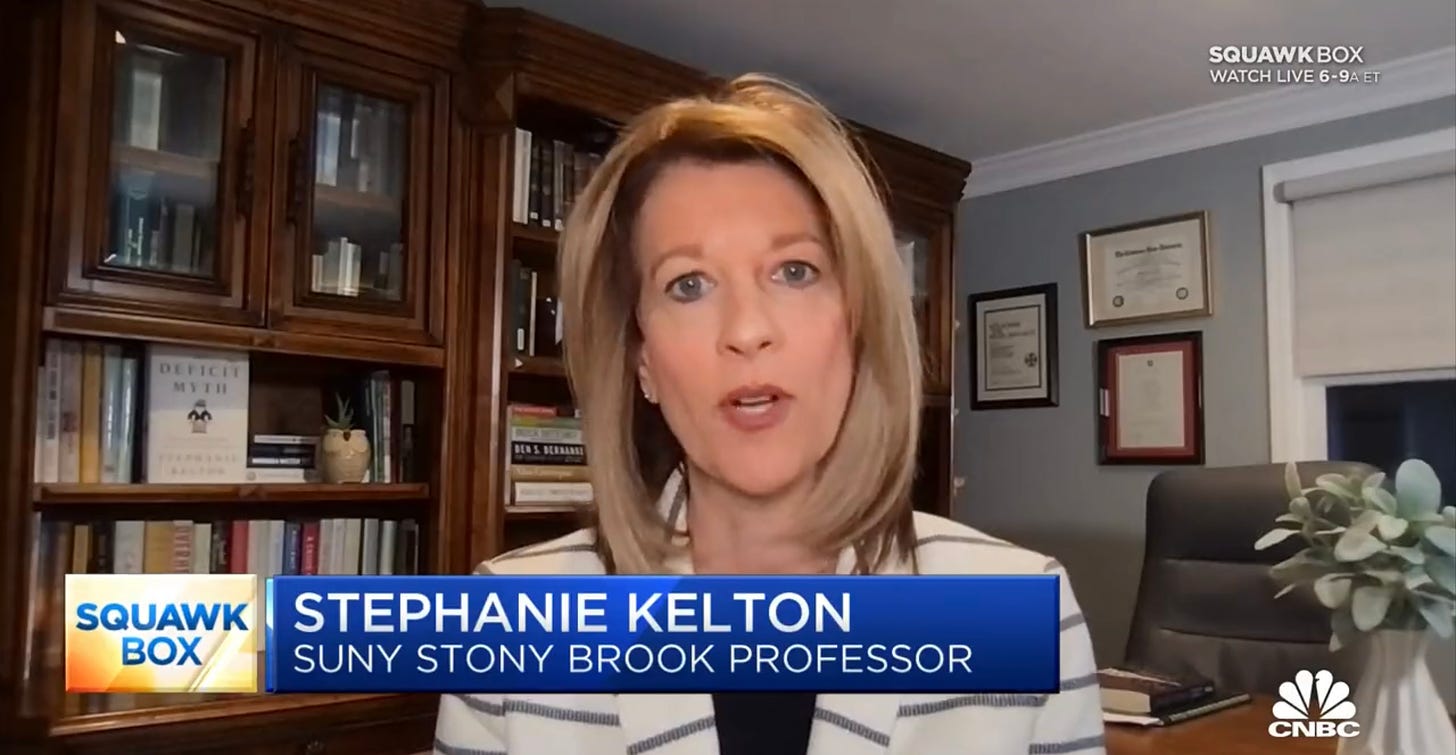Early this morning, I appeared on CNBC’s Squawk Box to talk about Democrats’ new proposal to include a “billionaire’s tax” in their (ever-dwindling) list of budget “pay-fors.”
Andrew Ross-Sorkin, one of the show’s hosts, asked me what I’d do if I were “king or queen for the day.” I should have started by saying that I would proclaim that henceforth the pay-for game shall be banished from this land. Unfortunately, Democrats dug in early, pledging that the entire Build Back Better agenda would be fully “paid for,” so it’s too late for a more sensible approach to drafting this legislation.
You’ll recall that President Biden initially called for a whole slew of tax increases to “pay for” his agenda. Personally, I never expected Democrats to come together and vote to raise all of this revenue.
In the summer of 2020, I served as a member of the Biden-Sanders “unity task force on the economy.” It’s where many of these proposals took shape. Week after week, I would press the Biden representatives—some of whom now serve in the administration—for an answer to the following question:
“What will you do when it eventually becomes clear that you don’t have the votes to “pay for” all of your proposed spending by raising a slew of taxes?”
As Sara Nelson and Darrick Hamilton can attest, I must have asked that question a dozen times.
Most members of the group probably didn’t appreciate my nagging interventions, but I had a sense that things would unfold the way they did.
So where are we? Jonathan Weismann of The New York Times explains:
“Democrats had hoped to pay for much of their social policy and climate spending by raising low capital gains tax rates for those earning at least $400,000, lifting the top personal income tax rate back to 39.6 percent from the 37 percent level that President Donald J. Trump secured in 2017, and increasing the corporate income tax rate to 25 or 26 percent from 22 percent. That corporate rate would still be far less than the 35 percent rate that Mr. Trump cut, while the top personal rate would return to where it stood for most of the past 25 years.
But in the 50-50 Senate, where all Republicans are opposed, they cannot afford to lose even one Democratic vote on the legislation, giving Ms. Sinema effective veto power over its contents.
To get around her resistance, they are looking to a proposal by Senator Ron Wyden, an Oregon Democrat and the Finance Committee chairman, that would raise hundreds of billions of dollars with a wealth tax on just 600 to 700 people — America’s billionaires. Mr. Wyden said his ‘billionaires’ tax’ is a political winner, a way to ensure that the richest of the rich do not escape income taxes altogether, as they have in some years.”
So that’s it. Senator Sinema (D-AZ) has snatched away most of the would-be “pay-fors,” leaving the rest of her party scrambling to find a substitute for the lost revenue. Taxing the unrealized capital gains that have accrued to a tiny cadre of America’s richest individuals is the new plan.
Why?
Some, like Patrick Chovanec, who teaches at Columbia University’s School of International and Public Affairs, say it’s about envy. That Democrats (or at least those who support the Wyden plan) are just jealous of people who have extraordinary wealth. So forcing them to write a check for billions of dollars to the IRS is a way to exact revenge.
I don’t think that’s right. I think Joe is right.
The truth is, we are where we are because of a string of unfortunate events. First, the Biden team decided long ago that they were going to push for one COVID relief package without any offsets—this became the $1.9 trillion American Rescue Plan we got in March 2021—followed by a “fully paid for” recovery package, which was split into the American Jobs Plan and the American Families Plan. Then, a fight broke out over the true meaning of “infrastructure,” and, to court Republican support for part of the agenda, Biden agreed to pare back the size and scope of his “hard” infrastructure package. This elbowed some of the “green infrastructure” out and shrank the overall package down to just $550 billion in new spending. It sailed through the Senate with bipartisan support, even though only about half of spending was “paid for.”
That left Democrats to try to figure out how to do the “soft” infrastructure piece on their own. In August, they agreed to a budget resolution framework that cleared the way for a $3.5 trillion reconciliation bill. Anticipating trouble on the “pay-for” front, the budget resolution granted borrowing authority for up to half of the total package. That gave Democrats the space to pass a $3.5 trillion package even if they could only come up with enough votes to offset $1.75 trillion. The problem is that Democrats have decided not to use that borrowing authority. Their message is that, unlike Trump’s fiscally irresponsible tax cuts, the Biden agenda will be “paid for.”
So why go after a handful of billionaires at this late stage in the game?
It’s not envy.
It’s desperation. And that desperation is itself the result of an unfortunate string of events that brought us to this point. The clock is ticking, and two Democratic senators are forcing the rest of the party to scramble for a replacement source of revenue. Why pick on the billionaires? It’s like when they asked Willie Sutton why he robbed banks:
“Because that’s where the money is.”
It’s not about revenge. It’s a last-ditch effort to push this thing across the finish line in a way that leaves all but a handful of wealthy billionaires unscathed.
Here’s a clip from this morning’s appearance.








Am I missing something here? Stephanie's 1998 groundbreaking paper showed that federal "Tax revenue" is an oxymoron. Why? Since the gov't runs deficits ($28.5 trillion so far), any tax receipts collected by the IRS get deposited in the Treasury's general account at the Federal Reserve, get credited against the spending that has already occurred, and, to keep the books straight, the credits offset the debits and the money simply disappears with a few computer keystrokes! There is no IRS piggy bank! If I'm understanding Stephanie's argument, this is why she argues so strenuously against "pay-fors." Federal taxes can't possibly pay for anything, although it's certainly true that state and local taxes can be construed as true revenue. Why? Because those gov'ts don't issue the currency! They actually need the money.
So why tax the wealthy? Because they have a high propensity to save, as Stephanie has argued, their wealth probably doesn't add much to inflation (the rich already have all the toilet paper and toothpaste that they need). OK, so the price of yachts and summer homes on Martha's Vineyard might go up, but who cares? So curbing inflation is not the reason to tax the wealthy, and we've already seen that we can't spend their tax "revenue" because it doesn't exist. So the absolute and moral reason to tax the rich is to limit their economic/political power. The key insight here is that we don't need taxes from the rich to invest in the programs that will benefit our citizens.
A final thought. Where do the rich suppose their financial wealth came from? US dollars don't grow on trees. And private banks have a nasty habit of wanting their loans to be repaid in full. So if you analyze the gross financial wealth denominated in US dollars around the world, you'll find that it tracks quite closely to the so-called US "national debt." The rich are wealthy precisely because the US gov't doesn't care about collecting as much tax as it spends in any given year. As Stephanie is fond of saying, the gov't's red ink is our black ink!
It's not MMT, it's not "envy". It is the same issue that countries are facing when the loopholes allow money to flow to tax advantaged sites, or to be harbored thru lobbied tax avoidance laws that shift the public's responsibilities onto those who don't have a level playing field to lobby for their own interests. It is related to what happens to countries with dollarized debt and are forced to privatize public assets (c.f. the saga of the economic hit men) or the outcome from the housing collapse of '08)